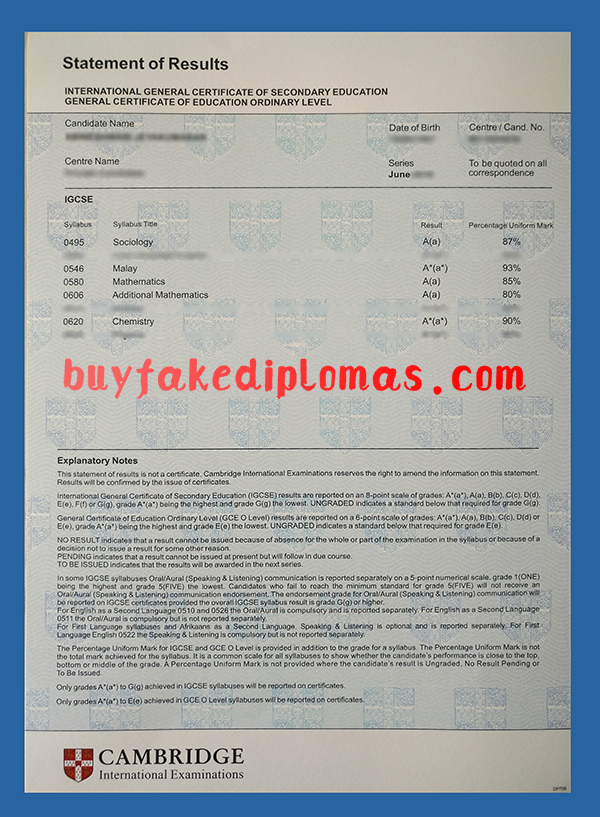We provide the best service at the most favorable price in the market. The original stamps / stickers, perfect and authentic seal and badge samples help you obtain the ideal certificate add our whatsapp: +86 15179517591
Obtain Fake Cambridge Statements of Results

Cambridge Statements of Results
The display drawing is a fake UCambridge Statements of Results Certificate carefully produced by our design and process production team through in-depth study of the original, combined with the customer’s personal information. The finished Certificate contains all of the security details of the original Cambridge Statements of Results Certificate, including the weight, thickness, size, color of the paper and the signature, number, watermark, seal, and salient on the certificate. The finished product has been affirmed and highly praised by customers. We also follow the advice of our clients, fake degree, fake diploma and a variety of other fake certificate services. Adhering to the philosophy of quality first, customer first, buyfakediploma.com are always committed to helping customers who need to improve the competitiveness of professional qualifications. With our help, you will get the ideal college diploma. A perfect report card; A good vocational qualification can be used to find a decent job, high salary and ideal position. Contact us. It can’t be a dream.
The format of the AS, A-Level and IGCSE transcripts is the same, with the biggest difference being the level. An AS is divided into five levels: a, b, c, d, and e. Traditionally, it is displayed in lowercase letters. A-level is divided into six grades: A*, A, B, C, D and E. With the graded AS and A-Level graded on the other hand, the graded is “u” or “U”. A-level has fixed grade thresholds of 90%, 80%, 70%, 60%, 50% and 40%. AS is A from 80% to 100%, and a* is not distinguished for more than 90%. How are percentage grades for AS and A-levels calculated? AS the CIE website shows for example, a student who got 75 out of 100 original ASEconomics scores in 2013 was getting a b(75%) AS economics grade if not Scaling. In 2014, he completed the other two A-Level economics papers(Part A2) besides AS. He got 21 points out of 30 for the paper, 48 points out of 70 for the part, and 69 points out of 100 for the A2 part.
If the A2 section does not have to be scaled, 75 plus 69 is 144 points, or 72% of the total 200 points in A-Level, where the grade is B and the percentage grade is 72%. AS and A2 should each make up about 50% of A-Level results if Scaling is not included in the calculation. In fact, Scaling is the norm in foreign education, where grades are not counted as much. Take a look at the real example of this student. In 2009, Louis got 94% A in his AS Chemistry. A year later, his A-level report card showed his Chemistry─Advanced Level─A*(a*)─100%. My understanding is that Louis did particularly well in A2 chemistry and was pushed up to 100% by the other candidates by combining it with AS and Scaling it.
AS and A-level results worldwide in June 2014, the percentage of AS students with a(above 80%) in each subject is as follows: Mathematics 26.5%, Physics 29.2%, Chemistry 29.3%, Biology 24.7%, Literature in English 14.4%, Language and Literature in English 11.7%, economics 27.2%, accounting 22.9%, history 6.5%, geography 14.8%. The percentage of A-level students with A*(90% or above) in each subject is 12.6% in maths, 11.4% in advanced Maths, 12.9% in physics, 11.8% in chemistry, 12.2% in biology and Literature in English 6.6%, economics 7.9%, accounting 6.1%, History 4.1% and geography 6.8%.
According to the CIEA-Level global results released in June 2014, 53.1 percent of A-level math students got A B(70 to 79 percent) or above, and 70 percent (B) grades looked decent, but actually fell below the average. Literature in English got 90%, ranking in the top 6.6% of the world. If you get 90% history, you can become a historian. What about the Law? The world that gets more than 90% gets only 1.8%. Marine Science was even more intriguing, with just 0.3 per cent reaching 90 per cent. Travel and Tourism, not to mention the fact that not A single candidate got an A*.
Interpreting the statistical analysis of global results will help to understand the difficulty of CIE courses for each subject, and also help to prepare for course selection before entering Cambridge courses. Only when you understand the overall results can you really understand your own results. The grades and percentages displayed in IGCSE, AS and A-Level are all relative results, so it is more important and worthwhile to go all out for the exam
